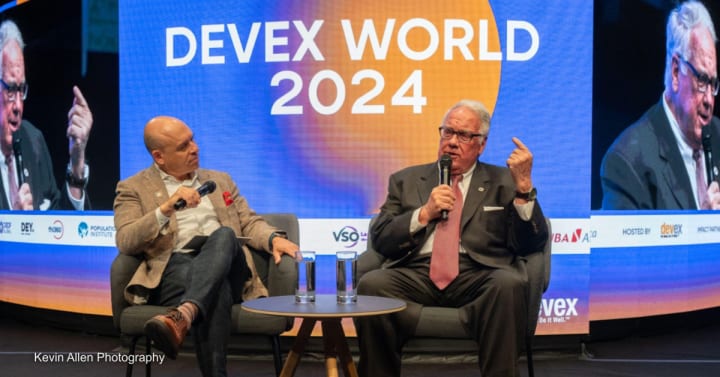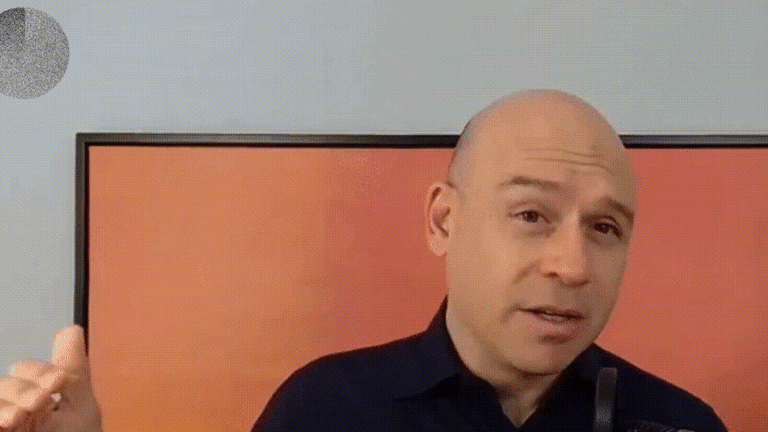
The numbers are remarkable, and so is the man behind them. Warren Buffett revealed a new plan this year to charge his three children with giving away his $150 billion fortune. He’s already donated billions to their individual foundations, and when the 94-year-old investing giant passes away (hopefully many years from now), his children will direct what could become the largest philanthropic initiative in human history.
Warren’s middle son Howard — who lives in Decatur, Illinois, sits on the board of Berkshire Hathaway, and is slated to one day be non-executive chairman — is remarkable for his own reasons too, and he’s already upending how private wealth tackles global crises.
You can judge for yourself by watching my recent in-depth conversation with Howard at Devex World. I’m confident you’ll see he is not your typical philanthropist. In fact, he’s also a photographer, farmer, sheriff, and corporate board member. While others write checks from boardrooms, Howard’s been perched on rubble in Bakhmut, documenting war crimes in Ukraine. When his sister calls, concerned about his whereabouts? "Oh, I'm in Brussels" — even as he makes his 15th trip to Ukraine's front lines.
From orangutans to artillery
Howard's journey is telling. He started his Howard G. Buffett Foundation focused on wildlife conservation, taking photos of orangutans. Then someone told him: "No one's going to starve to save a tree."
That clicked. In Uganda’s Bwindi Impenetrable National Forest, he saw a perfect line where villagers had stripped everything up to the park boundary — just to survive. In Tanzania, he visited remote villages ravaged by hunger. Conservation, he realized, means nothing without addressing human needs first.
The $500M minibus team
Now he's racing between global hotspots, giving away half a billion dollars annually with a staff you could fit in a minibus — just 22 people. That’s $25 million per employee. For perspective: The Gates Foundation manages around $4 million per employee. The Rockefeller Foundation? About $2.5 million.
"Our operating costs are 1% of distributions," he told me at Devex World. "That's too low. We need more people. But people are kind of a pain. You got to manage them. And then they want more vacation ..." he quipped.
His lean approach means lightning-fast decisions. While traditional donors schedule quarterly reviews, his team can "spend $50 million a day on something if we decide to spend it."
No time for meetings
His contract clause is famous: "We can terminate at any time for any reason, and you give us the money back."
And yes, he's used it. Partners were shocked when he devoted an entire annual report to the foundation's failures. "They thought it was a trick," he told me. But as Warren taught him: "The more you fail, the more you're going to learn."
The next chapter
Warren recently announced that 99.5% of his remaining wealth will flow to a charitable trust overseen by his children: Howard, 69; Susie, 71; and Peter, 66. Each already leads foundations with distinct missions, ranging from hunger and conflict to reproductive health and Indigenous communities.
Previously, Warren wanted it all distributed within 10 years of his death. But he appears to have softened that requirement, writing about “gradually” giving the massive wealth he’s accumulated in his latest letter. He’s also identified three younger successor trustees — names still under wraps — to help oversee this enormous philanthropic endeavor if any of his children pass on or can’t serve.
The timeframe for all this giving matters a lot. By my back-of-the-envelope math, a window of just 10 years would mean this new charitable trust could donate two to three times what the Gates Foundation gives each year. But even extending it for another decade would likely mean Buffett’s annual giving would be at least at the level of the Gates Foundation, one of the biggest philanthropic forces in history.
Why this matters now for development
Traditional aid is in retreat, as the World Bank and OCHA warn of unprecedented funding gaps. The U.K.’s aid budget is set to drop to its lowest point in 17 years and the governments of France and Germany have collapsed over budget pressures. Here in Washington, D.C., concern among development leaders is growing about the potential for deep aid cuts in Donald Trump’s second term as U.S. president.
As government aid recedes, private philanthropy may try to fill some of the gap — particularly when it comes to long-term development assistance in areas such as health and education.
That’s why Howard's unique approach could matter so much: His focus on addressing conflict sets him apart from other major philanthropists. His willingness to dive into the most troubled places and to commit enormous resources across sectors could be game-changing when much of the world’s poverty is increasingly concentrated in fragile and conflict-affected states.
As you’ll see from our conversation, Howard Buffett is self-deprecating and speaks more like the Midwestern farmer he is than a world-beating philanthropist. But don’t be fooled: This is a man on a mission to do some good in the world with the extraordinary hand he’s been dealt.
Going deeper
Missed the conversation?
What do you think about what Howard Buffett had to say? Let me know your thoughts at raj.kumar@devex.com.
+ Can’t get enough of Devex World? Check out our focus page to see every single story.
Sign up to Newswire for an inside look at the biggest stories in global development.




